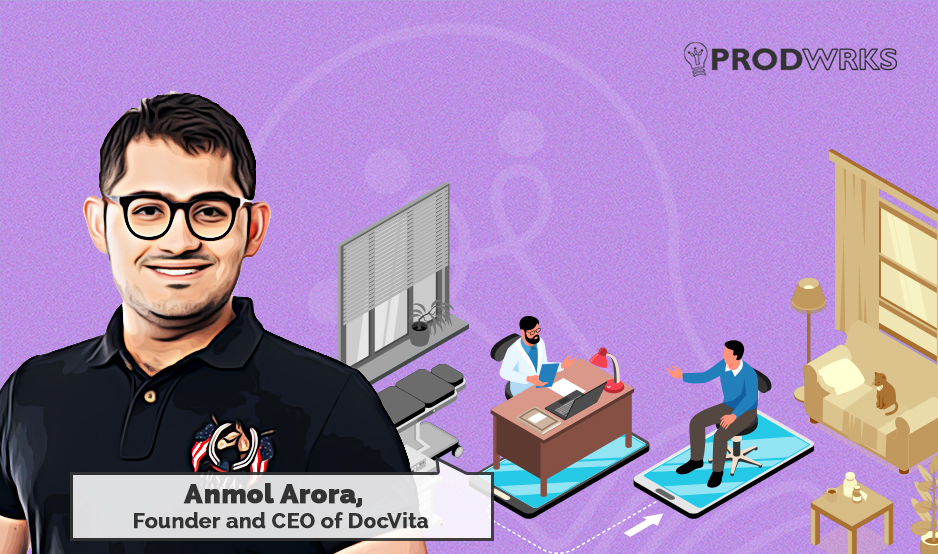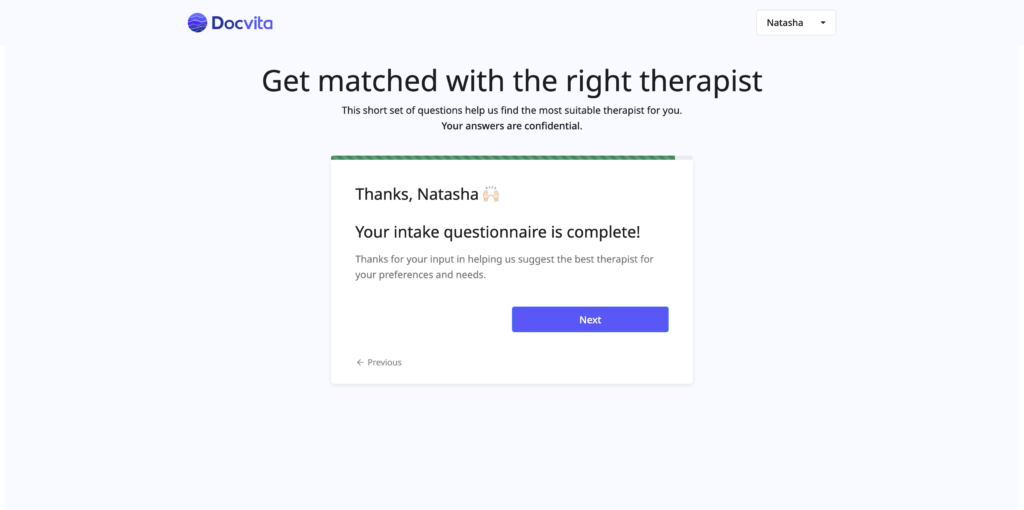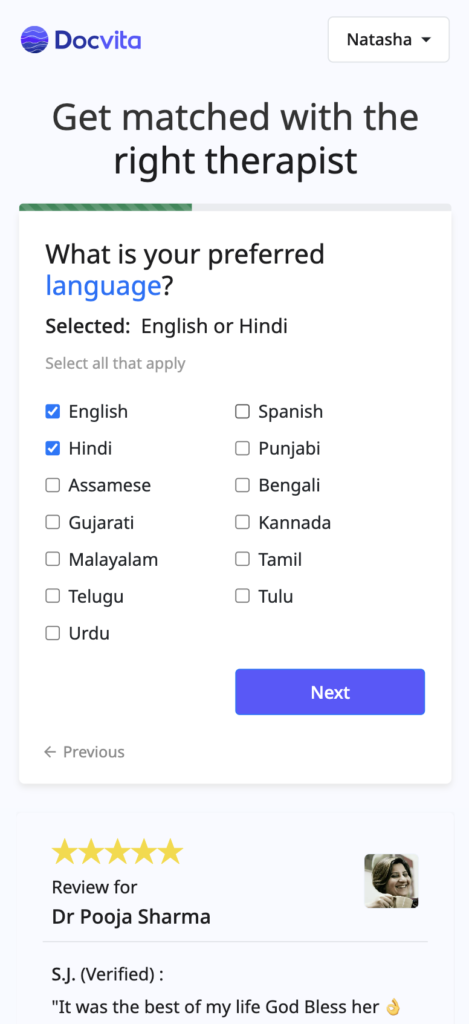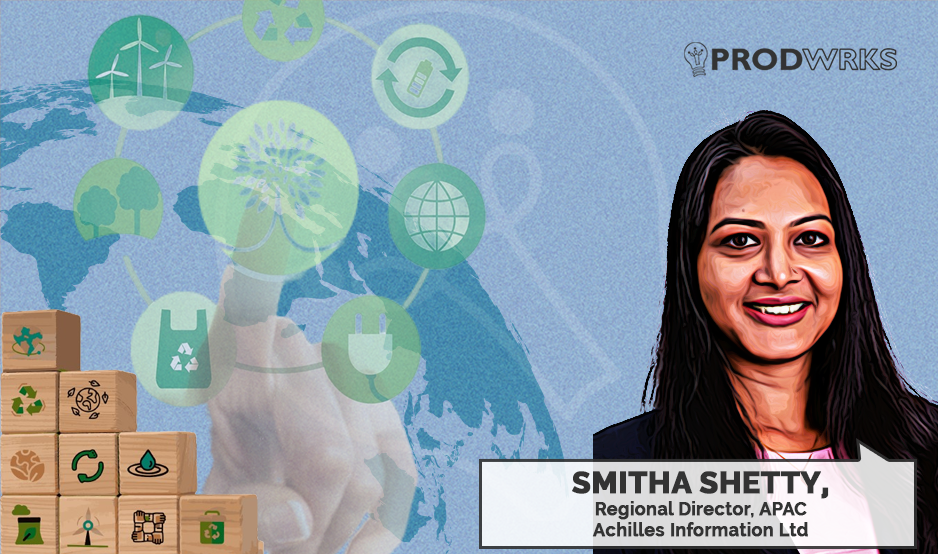
The mental health space, unlike other domains in healthcare, requires more nuanced matchmaking between care seekers and caregivers for sustained success. Anmol Arora, the Haryana-based founder of DocVita, has figured out the secret formula.
Incubated in Y Combinator, DocVita is a digital platform that connects individuals to the right therapists and psychiatrists. With 110 dedicated mental health professionals on their platform, DocVita has assisted over 15,000 individuals, couples, and families since its founding in 2020.
Starting as a general healthcare startup and pivoting to mental health, DocVita is seeing a 30-40% month-on-month growth since 2022 and a 5x growth projection for 2024. It is safe to say that DocVita is India’s fastest-growing, cashflow-positive mental health startup.
In a conversation with ProdWrks, Anmol discusses his strategic pivots and walks us through the challenges and triumphs along the way. As an added bonus, he gives us insights into his matchmaking strategy connecting therapists to care seekers, which made DocVita one of the largest mental health platforms in the country.
Solving the Broken Hospital Experience with Chota Hospitals
DocVita did not begin as a mental health company at the onset. Anmol’s journey into the healthcare and wellness space started in 2016 with Chota Hospitals – a technology services company solving problems in small healthcare facilities.


As students of IIT-Indore armed with a passion for software development, Anmol Arora and his cofounder and CTO, Vikram Patel identified important problems in the patient journey in clinics, diagnostic centres, and small hospitals.
Anmol said, “We started Chota Hospitals in 2016 and built solutions to help medical professionals automate routine tasks and enhance patient experience in India.”
The problems Anmol identified included long waiting times in clinics, appointment delays and cancellations, or anything that may have gone wrong in the patient journey which can potentially lead to a challenging interaction between patients and doctors. Solving these problems with technology gave Anmol crucial insights into the healthcare landscape and understand the hopes, dreams, and fears of care seekers and caregivers.
By 2019-20, Chota Hospitals had expanded its portfolio with solutions for appointment bookings, queue management, e-prescription, electronic medical records, telemedicine, and more. It evolved into a comprehensive patient relationship management system and finally DocVita.
The Pivot to Mental Health
Initially DocVita was not focussed on mental health and allowed patients to find any doctor. The platform facilitated online appointment bookings for patients with dermatologists, general physicians, gynaecologists, etc. A significant shift occurred in 2021 when the decision was made to pivot from general healthcare to mental health.
The shift was not only strategic but deeply personal when Anmol faced a personal challenge and needed therapy. He embarked on the daunting task of finding a suitable therapist for his well-being. The experience highlighted the significant gaps in the mental health space.
Anmol said, “In India, it’s a nightmare to find therapists who are registered with the Rehabilitation Council of India (RCI). It’s a big white space as it is not regulated. There is a proliferation of unlicensed and unverified individuals presenting themselves as therapists. When I finally found the right therapist for me, it was an ‘aha’ moment, and I realized a lot of people are also going through the same problem.”
Triggered by this personal incident, Anmol decided to expand the psychology vertical of DocVita by onboarding highly qualified, pre-vetted therapists. DocVita had a 30-40% surge in platform growth, month-on-month, driven by the unique characteristics of mental health care, particularly the frequency of client interactions compared to traditional healthcare.


“As a patient taking treatment for a physical condition, you’d only see a general physician twice or thrice a year. Our user retention insights revealed that a care seeker for mental health sees a therapist four times every month! Even people with chronic conditions like diabetes see their doctors only once every three months. It was surprising for us to see people returning to therapy so often.”
Spurred by the rising demand and potential of the platform, DocVita scaled from having 15 therapists to 90 therapists in a span of two months in 2022. It also led to the thesis that users would return for ongoing mental health support if DocVita curated a network of highly qualified and verified therapists, providing top-notch care on a digital platform.
Perfecting the matchmaking process
“We realized that when you become bigger people need help in zeroing in on the right therapist. I talked to the users to understand how the matchmaking could work and what parameters should go into the matchmaking algorithm.”
Anmol started manually matching the initial 500-600 patients to their therapists before they went on to write a matchmaking algorithm. User interviews with clients who had successfully connected with therapists revealed factors that users valued beyond cost – language, cultural understanding, and therapist characteristics played pivotal roles in their choices.


“India is a land of many cultures. Patients preferred a therapist who spoke the same language as them as they’d understand the cultural context of their problems. We also noticed a trend of people choosing therapists for a family member or a friend. Some users chose the therapist based on age. For instance, a daughter choosing a therapist for her mother wanted someone with experience and not a young therapist.”
However the most interesting user insight dismissed a wide-held misconception in the therapy field that people chose therapists based on cost.
“Over three months of user research revealed that people were less worried about the cost of the session and more worried about finding the right doctor. If they’d found the right doctor or therapist, the cost does not matter as much.”
The Results of Successful Matchmaking
“We actually stopped competing with all our competitors on price. We are building the business the right way by charging the right fee to our clients - so we don't overprice and we also don't underprice. We charge the fair fee the therapist deserves and price the services right to not burn any money from our side,” says Anmol.
This strategic shift culminated in DocVita turning cash flow positive last year, a testament to the efficacy of aligning pricing with user expectations. The platform has also reached a milestone of connecting 15,000 clients with the right therapists.
“We’ll soon reach the 20,000 mark of the number of people successfully matched with a therapist and taken one appointment or completed one transaction. This is our northstar metric as well. We don't chase vanity, we only chase impact. Impact is when we have successfully helped a user talk to a therapist and taken an appointment in the platform.”
AI with a Human Touch
Though DocVita today has a 21 point questionnaire which feeds into an algorithm for automatic matchmaking, Anmol still believes in the impact of a human touch in the matchmaking process, especially in a sensitive field like mental health.
“We are retaining the manually matching because of the nuances. For example, if a patient comes with a problem where they are not able to focus on work, it could stem from a variety of factors - maybe there's something in family, maybe it is ADHD, or maybe not.”
Anmol feels a mix of both human and AI intervention would work really well, to ask the right right questions to the patients and match them with the right therapist.
“We will be introducing the patient to three therapists or three calls with 10 minutes duration each, and they can choose which one to start with. We are also implementing machine learning algorithms to automate it and ask questions to help patients match with the best three therapists.”
Why Apps are Not Always a Panacea
“We tried to make it as easy as possible for everyone to approach treatment, fulfil their journey of therapy or psychiatry, and not change existing behaviours by introducing a new app in the process. Because, it's already overwhelming and it is not fair to ask someone going through a low period to do extra things like downloading an app to see an improvement.”
Anmol believes that not every aspect of the healthcare business necessitates an app.
“Most platforms, when introducing an app, will turn off every other channel and ask users to download the app to do everything. The modern-day problem is that not everybody has space on their phone to have your app or willing to download one. An app is not necessary at all times.”
By just focussing on WhatsApp as a medium for their treatment pathways, DocVita has made it incredibly easy for people of all ages to reach out and use their services. The platform extends a comforting sense of safety and familiarity, as all online appointments are conducted over trusted platforms like Google Meet or Zoom, facilitated by timely reminders on Whatsapp.
The Future of DocVita
As DocVita consolidates its position as one of India’s largest mental health platforms, Anmol outlines his plans for 2024 with a focus on quality, infrastructure, and an ambitious 5x growth target by scaling beyond 20,000 users and 500+ therapist.
“DocVita has transformed from a purely digital medium into a complete healthcare facility now with our own clinic in Koramangala, Bangalore. One of the bigger challenges that we face as we scale is to maintain the same quality as we go from 100 to 500 therapists on the platform,” added Anmol.
Anmol also wants to scale his digital services and is running AI experiments on an updated app which could supplement their existing patient journey on WhatApp.
“We are reimagining mobile health applications. It must be shared space between the patient and the therapist and give them tools to collaborate on treatment journeys. We are trying to bring elements of cognitive behavioural therapy and other therapies into the app to help the users understand their progress and have a higher chance of success in a shorter time.”
He says, “Don’t spend so much time with numbers and data. If you look at users as dots on the screen, you forget that they are real people who are interacting with your product to make a decision. Data can only fuel your confirmation biases or your negativity biases. The real story is the user’s story and user’s real motivation. Always prioritize people over dots or percentage or numbers.”



